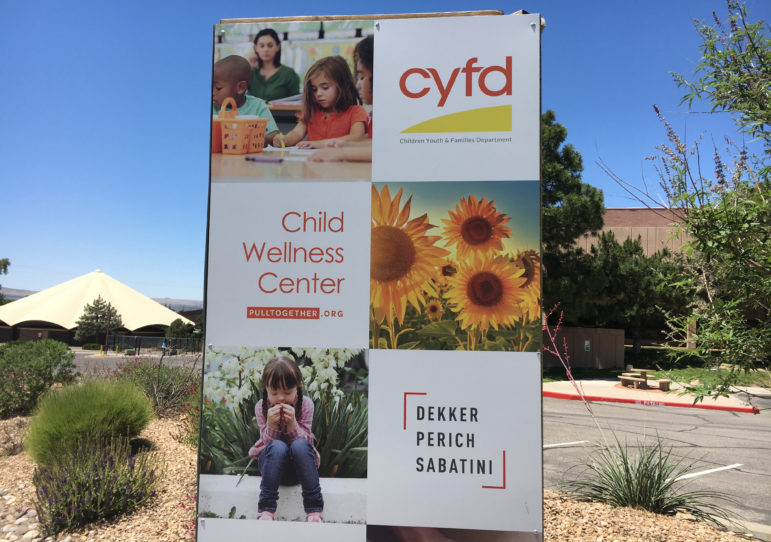
Steve Jansen
.
When Brian Blalock entered his new job as cabinet secretary at the Children, Youth and Families Department (CYFD) approximately a year and a half ago, he said there was no way for any of the approximately 2,200 employees to access the database unless they were in the office.
“There was no ability to remote into a [virtual private network] or access our data system,” said Blalock, who adds that CYFD’s technology was at least 15 years behind the times.
But over the past year-plus, CYFD has made “mind-blowing” technological advances, he said. A revamped information technologies department — which was in the works before the COVID-19 crisis but accelerated due to it — has enabled the protective services and juvenile justice divisions to manage cases with efficiency, even though a majority of face-to-face meetings are largely off limits per the New Mexico Supreme Court. CYFD’s technology still has room to grow, but Blalock says the overall upgrades have paid off during the pandemic and should continue to help CYFD staff, youth in care and families down the line.
“Our IT department has been amazing during the time of the pandemic, and we’re building an infrastructure that’s going to benefit us and our children and families for years after,” Blalock said.
He insists that he’s not hyperbolizing when he says he entered the dark ages of technology when he started at CYFD in January 2019. “Our data system is written in COBOL,” he said, referring to Common Business Oriented Language, a programming language that dates back to 1959. “It’s unreal.”
Fast forward to today, where approximately 80% of CYFD’s staff members are telecommuting and accessing the server from home, he said.
“Our technology has hit light speed but it’s still behind. Instead of 1992 technology, maybe we have 2004 technology,” said Blalock, only slightly tongue in cheek.
Some youth, families don’t have connectivity
The state child welfare agency, which is making plans to integrate two separate data systems that don’t always talk to one another, procured funding from the New Mexico Legislature to build out a state-of-the-art data module. Additionally, the agency is working with the New Mexico Human Services Department to create an integrated database system. “The pandemic isn’t going to slow that down,” he said.
For CYFD’s case workers, they now have the ability to remotely log into the database and enter critical information to each case file following a visit with a child or adult, which, these days, predominantly takes place by phone or video. This has been crucial for effective case management as well as personal safety, Blalock said.
“If we don’t have technology, our workers can’t telework and we would be putting them at increased risk for exposure,” he said.
While CYFD’s technology is now firmly rooted in this century, that’s often not the case for some New Mexico families. Internet connectivity for some youth and parents, especially for those living in rural or resource-poor areas, are either so slow it’s not worth even trying to join a Zoom meeting or there’s no online connection at all.
[Related: New Mexico Tribal, State Leaders Pulling Together Against Pandemic]
[Related: COVID-19 Challenges Don’t Stop Carlsbad Transitional Housing Program]
[Related: For New Mexican, Tribal Leaders, It’s ‘All Hands on Deck’ in 2 Counties]
[Related: Las Cruces Case Worker Helping Youth Who Have Aged Out of Care Plus the System-involved]
That’s why protective services staff have been “overvisiting” youth and families with phone calls, video conferencing (when possible) and text messages. The Albuquerque-based child advocacy nonprofits NMCAN and New Day Youth and Family Services have helped organize Zoom calls with former youth in care who might need extra support during the pandemic. And CYFD has distributed phones to biological parents so that they can keep in touch with their kids who are in foster care placements.
CYFD’s Behavioral Health Services division recently received the go-ahead from federal officials to perform telehealth through popular platforms, such as Facebook Messenger, Google Hangouts and the encrypted messaging service Signal, Blalock said. These apps were not federally approved for telemedicine before the coronavirus, he said.
“We’re trying to get as many clinicians as we can into the computers and the smartphones of all of our kids and parents who need [telehealth] during this time of great anxiety and panic,” he said.
Like other difficulties that have confronted CYFD during the coronavirus outbreak, the organization is taking an optimistic, long-game approach to its technology improvements.
“[The pandemic] is a horrible tragedy, but we’ve deployed technology that’s helping people now through this emergency situation,” Blalock said. “It’s also going to put us in better shape to help children later.”
This story is part of a Youth Today project on foster care in New Mexico. It’s made possible in part by the May and Stanley Smith Charitable Trust. Youth Today is solely responsible for the content and maintains editorial independence.

























